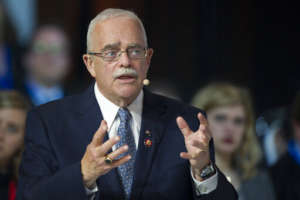

A Bipartisan Policy Center task force said agencies and heir inspectors general should focus less on compliance and more on improving their organizational...
The current state of oversight within the executive branch — at least according to a group of former agency managers and leaders — reads a little bit like a common phrase in an inspector general or Government Accountability Office report: “Progress made, more progress needed.”
A Bipartisan Policy Center task force recently examined the oversight bodies that keep watch over executive branch agencies — and how well those agencies actually respond and take action on recommendations to improve their performance.
The task force includes former directors and officials from the Office of Personnel Management, Office of Management and Budget, GAO and other federal agencies.
Though the executive branch has taken more concerted efforts to champion enterprise risk management, agencies spend too much complying with reporting requirements and answering to oversight recommendations, the task force argued.
Agencies don’t spend enough time making actual improvements to their organization’s performance.

Agencies and oversight organizations, including Congress, haven’t developed a relationship and culture that assumes some risk at the outset, the task force said.
And agencies, knowing their mistakes could end up as a top headline or the subject of a heated congressional hearing, aren’t incentivized to take those risks.
“If overseers are aware of risks that agencies are taking prior to any incident, and if overseers were satisfied that mitigation of these risks was taken seriously, we avoid the type of ‘gotcha’ oversight that often stymies innovation and breakthroughs,” Rep. Gerry Connolly (D-Va.), chairman of the Oversight and Reform Government Operations Subcommittee, said last Tuesday at an event in Washington, D.C., to launch the Bipartisan Policy Center’s new report. “And here Congress is part of the problem. We just can’t resist the temptation to highlight something gone wrong. Politically, the payoff is just great. But when you do that, every time you do that, you’re taking a bite out of the willingness of federal employees and managers to take risk.”
For Connolly, the ongoing back-and-forth that has defined much of the dialogue behind the Trump administration’s proposed merger of OPM with the General Services Administration is not one of those “gotcha” moments.
“OPM is a great case study,” he said. “It’s a great case study of why we need compliance, why we need performance, why we need accountability and why we need oversight.”
The repeated requests for more details, plans and an analysis of what legal authorities the Trump administration believes it has to carry out the merger, are the types of oversight activities that he believes are necessary, Connolly said.
But the administration sees the current situation with OPM — its repeated IG recommendations and failing or poor grades on the Federal IT Acquisition Reform Act (FITARA) and Federal Information Security Management (FISMA) Act scorecards — as the impetus for change.


The current structure isn’t working, the administration has said, and OPM isn’t well-equipped to oversee the merit system principles it’s supposed to protect.
“That proposal and other reorganization proposals are sort of risky for the administration to put out there,” Peter Warren, OMB associate director, said of the OPM-GSA merger. “Usually we’re proposing things that are easy to criticize. We’re often responding to issues that others have identified … but maybe haven’t put forward proposals.”
The Bipartisan Policy Center’s task force, though comprised of several former OPM directors and OMB officials, doesn’t lend a specific opinion on the agency or the administration’s proposal.
It did, however, offer up a variety of broad recommendations for the oversight community as a whole, which includes OPM, GSA and OMB, along with Congress, the Government Accountability Office and the inspector general community.
Inspectors general and the Government Accountability Office should, for example, focus their recommendations more on specific agency outcomes and performance measures, the task force said.
Internal oversight organizations could also collaborate more often with outside oversight groups like the IGs and GAO in issuing recommendations and tracking agencies’ progress.
Agencies, with help from their inspectors general and GAO, should spend more time on their own performance and less time on compliance-based activities.
Connolly, however, challenged the notion that agencies often spend too much time on compliance to the detriment of their own mission activities.
“Performance seeks to achieve policy results that matter to real people. Compliance ensures that those results are achieved in ways that comport with our democratic values and with the goals we’ve set legislatively as a society,” he said. “Compliance ensures that the decision making chain that leads to government performance outcomes are more diverse and inclusive than in the private sector.”
Copyright © 2025 Federal News Network. All rights reserved. This website is not intended for users located within the European Economic Area.
Nicole Ogrysko is a reporter for Federal News Network focusing on the federal workforce and federal pay and benefits.
Follow @nogryskoWFED
